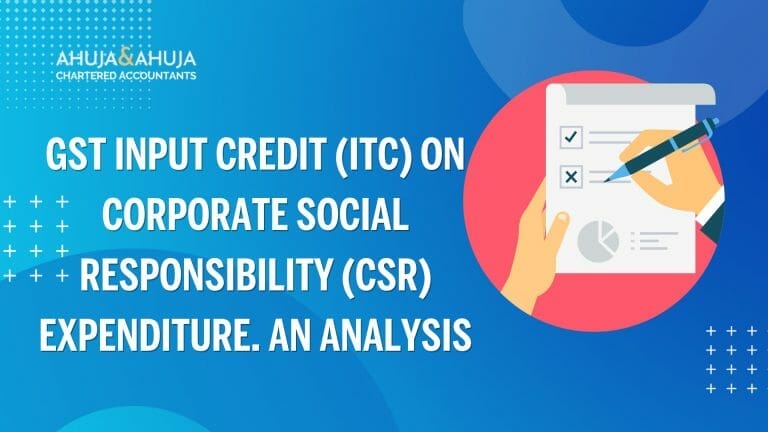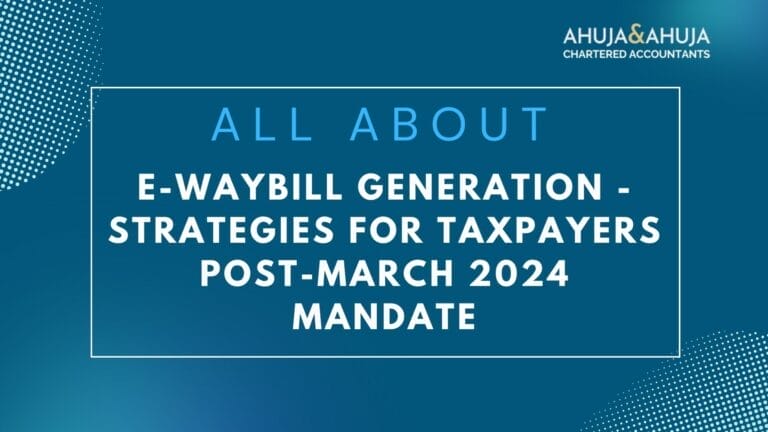New GST Updates to Streamline Sale of Good by Unregistered Sellers via Ecommerce Operators (Portals)
India’s taxation landscape is unceasingly metamorphosing, signifying the country’s commitment to bolstering economic advancements, smoothing out complex procedures, and ensuring that businesses and individuals comply with the set Goods and Services Tax (GST) rules. Fostering an environment that promotes efficiency and compliance has always been the cornerstone of the GST framework .
On the 12th of October, 2023, the Central Board of Indirect Taxes and Customs (CBIC) bestowed the industry with a wave of critical updates influencing the mechanism of supply of goods by unregistered dealers through e-commerce operators (ECOs). These alterations in the marketplace aren’t merely changes—they’re windows of opportunities, priming to streamline processes and revitalize the vibrancy of India’s e-commerce arena.
In the heart of our discussion today, we’ll dissect these recent amendments, surveying not only their technical aspects but also their implications on businesses big and small. The corridors of e-commerce in India are ringing with new rules—from the advent of the Goods and Services Tax Network (GSTN) joining hands with e-commerce operators, to the exemptions granted to unregistered suppliers. It’s about time we demystify these changes and assess what they mean for India’s burgeoning e-commerce sector .
As we dive deeper into the nitty-gritty of these updates, it’s crucial to apprehend the role of e-commerce platforms in the Indian market. Acting as the linchpin of digital trade, ECOs sync buyers with sellers, establishing the framework and supply-chain infrastructure for businesses and solopreneurs alike to showcase their products and services to a massive online audience. This modus operandi has precipitously revolutionized business operations in the country and buttressed e-commerce as an indomitable juggernaut in India’s commercial landscape .
The prowess of these operators rests in their capacity to facilitate efficient transactions, manage a network of inventories, and even streamline payments. This integrated approach has swung the doors of opportunity wide open for countless businesses and solo sellers to tap into a capillary of consumers across the lengths and breadths of India—thus unlocking new avenues for expansion and growth. Accommodating the rise of e-commerce, the government realizes the imperative need to harmonize tax structures aligning with this accelerative sector .
In the next section, we’ll explore the new facility and its significance in enhancing the business-friendly environment for both registered and unregistered dealers.
- GST E-invoicing limit reduced to 5 Crores from 1st August 2023
- GST Registration Services in India
- GST Checklist Action Points for GST Returns
- GST Litigation Services
The Facility for E-commerce Operators
Central to the updates is the introduction of a facilitation mechanism that empowers e-commerce operators (ECOs) to enable unregistered suppliers to sell their goods through their platforms. This facility aims to simplify the process for unregistered suppliers, ensuring compliance with GST regulations, and ultimately driving the growth of e-commerce in India.
To make this facilitation possible, the GSTN has played a crucial role in developing Application Programming Interfaces (APIs) specifically tailored for ECOs. These APIs serve several functions, primarily focused on validating the demographic details of unregistered suppliers and enabling tracking and reporting of their supplies. Two key APIs in this process are:
- Unregistered Applicants API: This API allows ECOs to retrieve the details of unregistered applicants by passing their enrolment ID in a GET request.
- Unregistered Applicants Validation API: This API plays a vital role in validating the mobile number and email ID associated with an enrolment ID.
In order to effectively access and integrate these APIs, e-commerce operators need to consider the following key points:
- Collaboration with a GST Suvidha Provider (GSP) is essential, as these APIs are not publicly available. An authentication token, necessary for accessing the APIs, can be obtained through the authentication API, with the API specifications available at the developer portal.
- Access to the public APIs requires the acquisition of authentication tokens using the credentials of the GSP.
- The API specifications for these e-commerce APIs are accessible on the developer portal.
- It’s important to note that the response from both APIs is Base64 encoded, with no encryption used.
The introduction of these APIs and the facilitation mechanism signifies a major step in integrating unregistered suppliers into the structured GST framework. It allows e-commerce operators to seamlessly onboard unregistered suppliers without compromising compliance standards. This streamlining of the process also ensures better transparency and audit capabilities for the tax authorities while promoting ease of doing business for unregistered suppliers.
The Enrolment Process for Unregistered Suppliers
The enrolment process for unregistered suppliers has been streamlined, making it accessible through the GST Portal. Unregistered suppliers who wish to enroll for making supplies of goods through ECOs in any one State or Union Territory can follow a straightforward process:
- Visit the GST Portal: Unregistered suppliers need to visit the GST Portal at https://www.gst.gov.in/.
- Generate User ID: In the “User Services” tab, they should choose “Generate User ID for Unregistered Applicant.”
- Proceed with Caution: Upon encountering a warning window, they should click “Yes” to proceed.
- Application for E-commerce: In the form that opens on the screen, they should check the “To apply as a supplier to e-commerce operators” box.
- Complete the Form: The applicant should fill out the form as it appears on their screen.
- Enrolment Number Generation: After successful validation of the PAN, the enrolment number will be generated by the portal.
The enrolment process has been designed to be user-friendly, enabling unregistered suppliers to easily navigate the steps and complete the necessary documentation. This streamlined process is aimed at facilitating the participation of unregistered suppliers in the e-commerce ecosystem and expanding their reach to a wider customer base.
As unregistered suppliers complete the enrolment process, they can take advantage of the simplified onboarding mechanism and tap into the opportunities presented by e-commerce platforms.
Implications of the Updates
The introduction of these updates brings several implications for the e-commerce sector in India. Let’s explore some of the key aspects that businesses, e-commerce operators, and unregistered suppliers need to consider:
- Simplified Processes: With the facility for unregistered suppliers to engage with e-commerce operators without mandatory GST registration, the onboarding process is significantly simplified. This means that smaller sellers, startups, and individuals can access a broader market without the administrative burden of GST registration.
- Access to a Wider Audience: E-commerce operators will now have the ability to integrate unregistered suppliers into their platforms. This expands their product offerings and potentially attracts a more extensive customer base. Unregistered suppliers, on the other hand, can reach a larger audience without the need for individual platforms or websites.
- Streamlined Compliance: By leveraging the APIs developed by GSTN, e-commerce operators can ensure that the unregistered suppliers they onboard are compliant with GST regulations. This minimizes the risk of non-compliance and simplifies the reporting of supplies.
- PAN Validation: The requirement for unregistered suppliers to possess a Permanent Account Number (PAN) and validate it through the GST Portal not only ensures transparency but also provides a level of credibility for consumers. It instills confidence in buyers as they can verify the authenticity of the suppliers.
- Business Expansion: Smaller businesses, especially those operating within one State or Union Territory, can now explore opportunities to scale their operations through e-commerce, tapping into the growing trend of online shopping. This opens up avenues for growth and increased revenue for unregistered suppliers.
- Cost-Efficiency: By removing the need for GST registration, businesses can save on compliance costs and administrative overhead, potentially improving their overall profitability.
- User-Friendly Process: The user-friendly enrolment process on the GST Portal makes it easier for unregistered suppliers to adapt to the changes and benefit from the exemption. They can seamlessly enroll and start selling their goods through e-commerce platforms, expanding their business reach.
These implications highlight the positive impact of the updates on the e-commerce sector, offering opportunities for growth and simplifying processes for both e-commerce operators and unregistered suppliers.
Conclusion
In conclusion, the recent updates regarding the supply of goods by unregistered persons through e-commerce operators signify a significant step forward in streamlining processes, promoting e-commerce, and ensuring compliance with GST regulations in India. The integration of unregistered suppliers into the GST framework, facilitated by the collaboration between GSTN and e-commerce operators, opens up new avenues for growth and expansion in the e-commerce sector.
These updates have simplified the onboarding process for unregistered suppliers, allowing them to access a broader market without the burden of mandatory GST registration. The collaboration between e-commerce operators and unregistered suppliers enables them to tap into the growing trend of online shopping and reach a wider audience.
Furthermore, the APIs developed by GSTN provide a streamlined mechanism for tracking and reporting supplies, ensuring compliance with GST regulations. The requirement for suppliers to possess and validate their PAN adds transparency and credibility to the process.
Small businesses, particularly those operating within a single state or union territory, now have the opportunity to scale their operations through e-commerce. By removing the need for GST registration, the updates offer cost savings and administrative efficiencies, contributing to improved profitability.
As these changes continue to shape India’s e-commerce landscape, it is crucial for businesses, e-commerce operators, and unregistered suppliers to adapt to and stay informed about the evolving tax regulations. The dynamic nature of India’s tax system emphasizes the importance of staying updated and adhering to regulatory changes, while exploring new opportunities presented by tax authorities.
By embracing these updates and leveraging the seamless integration between unregistered suppliers and e-commerce operators, businesses can unlock the potential for growth in the dynamic e-commerce ecosystem while ensuring compliance with GST regulations.
Disclaimer
The materials provided herein are solely for educational and informational purposes. No attorney/professional-client relationship is created when you access or use the site or the materials. The information presented on this site does not constitute legal or professional advice and should not be relied upon for such purposes or used as a substitute for professional or legal advice.







